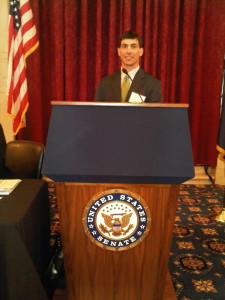 Scott Filler was born in New York and grew up in San Francisco, California. Upon graduating from high school, Scott Filler attended Brown University and majored in a combined degree in applied mathematics and biology. Having a natural interest in sciences and the human body, Scott was given the opportunity to travel to Kenya as a junior in college. Scott was in Kenya for a semester and in that time he got malaria and became very sick. It was at that moment in his life that he realized he wanted to make a difference in malaria research, prevention, and treatment and decided to devote his life to the cause.
Scott Filler was born in New York and grew up in San Francisco, California. Upon graduating from high school, Scott Filler attended Brown University and majored in a combined degree in applied mathematics and biology. Having a natural interest in sciences and the human body, Scott was given the opportunity to travel to Kenya as a junior in college. Scott was in Kenya for a semester and in that time he got malaria and became very sick. It was at that moment in his life that he realized he wanted to make a difference in malaria research, prevention, and treatment and decided to devote his life to the cause.
Scott Filler now works in Geneva, Switzerland with The Global Fund to Fight AIDS, Tuberculosis, and Malaria as a Senior Disease Coordinator. The Global Fund works with partners to fund prevention and treatment of these diseases across the globe. They have the historic opportunity to make sure these funds have an impact on in the hopes to eliminate the diseases as a threat to public health. Scott Filler works directly with The Global Fund’s strategy and has a strong voice in investment decisions. He plays an instrumental role in ensuring resources are directed to the interventions that will make the most impact.
More on malaria
Malaria is transmitted by mosquitoes and is passed from an infected female mosquito bite when the mosquito’s saliva enters the person’s circulatory system. Once in the blood, the parasites emitted will travel to the person’s liver where they will mature and reproduce. The most common symptoms of malaria are fever, stomach pain, and headache but severe cases can lead to coma or even death.
Malaria is more common in tropical regions because of the amount of rainfall, stagnant water, and warm temperatures that are ideal for mosquito larvae. Malaria is typically diagnosed by using a sample on a blood film or by performing a rapid diagnostic test. Modern technology and techniques have allowed for polymerase chain reaction testing to examine the parasite’s DNA but because of their complexity and cost these are rarely used in areas considered as malaria-endemic.
While no effective vaccine exists, there are ways to decrease the burden of disease:
Where malaria exacts the largest burden, Africa, it has been extremely difficult to control. Many reasons account for this: an efficient mosquito that transmits the infection, a high prevalence of the most deadly species of the parasite, favorable climate, weak infrastructure to address the disease, and high intervention costs that are difficult to bear in poor countries.
However, the scale-up of effective, safe, and proven prevention and control interventions made possible by global support and national commitment has shown that the impact of malaria on residents of malaria-endemic countries can be dramatically reduced when these are used together.